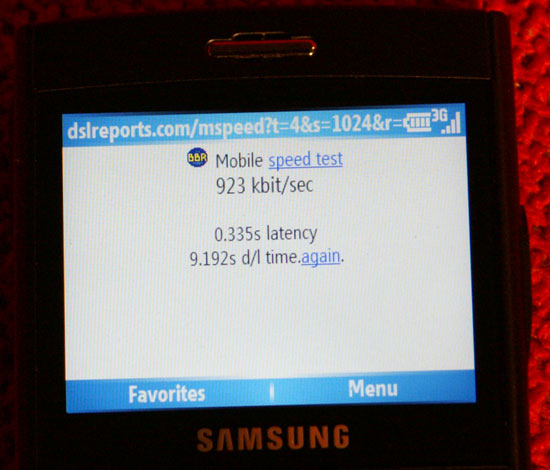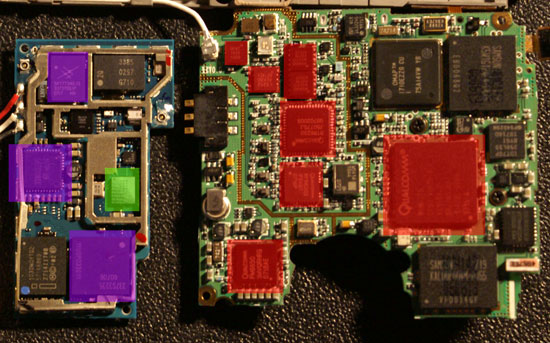No 3G on the iPhone, but why? A Battery Life Analysis
by Anand Lal Shimpi on July 13, 2007 3:53 AM EST- Posted in
- Smartphones
- Mobile
Most of the initial reviews of Apple's iPhone shared one complaint in common: AT&T's EDGE network was slow, and it's the fastest cellular network the iPhone supported. In an interview with The Wall Street Journal, Steve Jobs explained Apple's rationale for not including 3G support in the initial iPhone:
"When we looked at 3G, the chipsets are not quite mature, in the sense that they're not low-enough power for what we were looking for. They were not integrated enough, so they took up too much physical space. We cared a lot about battery life and we cared a lot about physical size. Down the road, I'm sure some of those tradeoffs will become more favorable towards 3G but as of now we think we made a pretty good doggone decision."
The primary benefit of 3G support is obvious: faster data rates. Using dslreports.com's mobile speed test, we were able to pull an average of 100kbps off of AT&T's EDGE network as compared to 1Mbps on its 3G UMTS/WCDMA network.

Apple's stance is that the iPhone gives you a slower than 3G solution with EDGE, that doesn't consume a lot of power, and a faster than 3G solution with Wi-Fi when you're in range of a network. Our tests showed that on Wi-Fi, the iPhone was able to pull between 1 and 2Mbps, which is faster than what we got over UMTS but not tremendously faster. While we appreciate the iPhone's Wi-Fi support, the lightning quick iPhone interface makes those times that you're on EDGE feel even slower than on other phones. Admittedly it doesn't take too long to get used to, but we wanted to dig a little deeper and see what really kept 3G out of the iPhone.
Pointing at size and power consumption, Steve gave us two targets to investigate. The space argument is an easy one to confirm, we cracked open the Samsung Blackjack and looked at its 3G UMTS implementation, powered by Qualcomm:

Mr. Jobs indicated that integration was a limitation to bringing UMTS to the iPhone, so we attempted to identify all of the chips Apple used for its GSM/EDGE implementation (shown in purple) vs. what Samsung had to use for its Blackjack (shown in red):

Motherboard Battle: iPhone (left) vs. Blackjack (right), only one layer of the iPhone's motherboard is present
The largest chip on both motherboards contains the multimedia engine which houses the modem itself, GSM/EDGE in the case of the iPhone's motherboard (left) and GSM/EDGE/UMTS in the case of the Blackjack's motherboard (right). The two smaller chips on the iPhone appear to be the GSM transmitter/receiver and the GSM signal amplifier. On the Blackjack, the chip in the lower left is a Qualcomm power management chip that works in conjunction with the larger multimedia engine we mentioned above. The two medium sized ICs in the middle appear to be the UMTS/EDGE transmitter/receivers, while the remaining chips are power amplifiers.
The iPhone would have to be a bit thicker, wider or longer to accommodate the same 3G UMTS interface that Samsung used in its Blackjack. Instead, Apple went with Wi-Fi alongside GSM - the square in green shows the Marvell 802.11b/g WLAN controller needed to enable Wi-Fi.
So the integration argument checks out, but what about the impact on battery life? In order to answer that question we looked at two smartphones - the Samsung Blackjack and Apple's iPhone. The Blackjack would be our 3G vs. EDGE testbed, while we'd look at the impact of Wi-Fi on power consumption using the iPhone.










36 Comments
View All Comments
James Fixen - Tuesday, July 15, 2008 - link
Had a good laugh: a smart Dutch dude became so angry that his battery of his iPhone 3G drained, that he asked some manufacturers in Linkedin to built him a rechargable, strong but small battery without funny cases or cables. The product will be out in two weeks and gives, almost 70% more energy (1770 mAh) than earlier devices, f.e. Kensington or iSound (1000 mAh).coco - Tuesday, July 15, 2008 - link
Sure the battery on iPhone 3G is not that great, but what can we do? We want small size phones, powerful features and lengthy battery life.Just get a backup battery. I got mine from iPhoneck brands. Their new 3G backup battery is probably one of the better looking products in the market. Their website is www.iphoneck.com
abpages - Wednesday, May 28, 2008 - link
Yep same here, i'm in Australia and would have bought an iPhone if it supported 3G. Such a shame. I ended up with a Samsung Blackjack and it's fantastic sofar.Ron Stark
http://www.BrisbaneWebDesign.net.au">http://www.BrisbaneWebDesign.net.au
edwinder - Sunday, July 22, 2007 - link
Hi Anand,Stop defending the iPhone's lack of 3G. (You seem to keep justifying their lack of the 3G feature saying how they made a 'wise' choice). In other parts of the world, and its a very well known fact that 3G drains the battery tremendously. Yet every single phone has 3G and we work within their operating limits.
From a technology/market demand/innovation perspective, adoption of new technologies will push the envelope that will benefit the end users (you and me). This pushes the manufacturer to keep innovating, unlike Apple, who decided to take one step back and provide less features and charge you a bomb for it, and you keep praising them.
I'm disappointed.
Edwinder
peternelson - Tuesday, July 17, 2007 - link
Despite the hype about the justification for using old wireless standards: ie physical space and power consumption aka battery life, I think there is another important factor they neglected to mention:Since 2G is less chips, less pcb assembly mounting and traces, and the chips themselves are simpler and more mature, THE OLD CHIPS MAKE IT CHEAPER TO MANUFACTURE THAN 3G.
Simple as that. Reduced costs of production and parts make for bigger profits.
That is the truthful reason, but they are not likely to admit that as a primary factor in the decision. It wouldn't be "cool" to tell people their equipment is outdated already.
Squuiid - Tuesday, July 17, 2007 - link
I have an AT&T 8525 and disable 3G on it.When using MS Push I get less than 10hrs on it with 3G, I'm in NYC with full signal all day.
On GSM it lasts all day till I get to charge it at night. So even thought I have the 3G capability, it is unusable due to ridiculous power consumption.
sprockkets - Saturday, July 14, 2007 - link
Are you saying you can use edge to make voice conversations instead of GSM? I have never heard of that. So what about GPRS.The whole point of why you get less talk time over UMTS is because it is WCDMA and is inherit in the technology. Wikipedia it and see for yourself.
While not real proof, if I use an edge connection for data, it sounds like a voice conversation over speakers. Sure you use edge for voice?
drwho9437 - Saturday, July 14, 2007 - link
It is not clear to me from your webpage results that the faster connection wasn't largely impacted by the fact that it simply rendered more pages. That is what is the cost of rendering the page, not just getting the data.The talk time stuff is interesting, looks like something you could fix up in firmware easily though.
nvmarino - Friday, July 13, 2007 - link
It would be helpful to know how long the battery lasted on both phones with the screen on but doing nothing.And what the hell did you guys talk about for 9 hours, anyway?
"Can you hear me now?"
"Good..."
:)
--Nino
kennyb - Saturday, July 14, 2007 - link
Excellent article. The first time i saw an iPhone i knew Apple wouldn't allow a user-replaceable battery. Why? It would ruin the iPhone's aesthetics. If you've ever bought a Mac before you'd understand. I expect Apple to incorporate a really slick mechanism to open the chassis without uglifying the iPhone sometime soon.Also, when i heard that 3G would not be supported, i immediately thought about [chip]space. Maybe EL Stevo mandated that the iPhone not exceed "X" mm thickness. Hey, it happened with the Powerbook G4.
Yeah, i want one. Yeah, i don't need one.